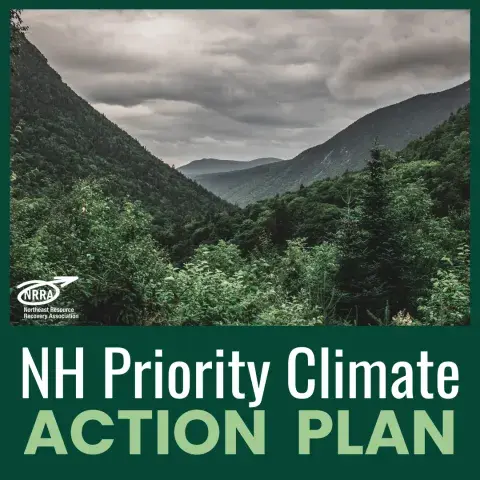
The New Hampshire Department of Environmental Services (NHDES) recently submitted New Hampshire's Priority Climate Action Plan (PCAP) to the EPA. NRRA was glad to see that solid waste considerations were included - specifically related to food waste, asphalt, and concrete - topics NRRA is currently focused on with grant-supported projects through the USDA and EPA.
From the PCAP:
The New Hampshire Priority Climate Action Plan (PCAP) was developed by the New Hampshire Department of Environmental Services (NHDES) utilizing a planning grant from the U.S. Environmental Protection Agency (EPA). The goal of the PCAP is to create a pathway that will support investment in policies, practices, and technologies that reduce pollutant emissions, create high-quality jobs, spur economic growth, and enhance the quality of life for all Granite Staters. The PCAP includes the following: a summary of New Hampshire’s past and present greenhouse gas (GHG) emissions; a detailed, state-level GHG inventory; a list of priority measures that could reduce the state’s GHG emissions; and an analysis of how those measures would benefit low-income, disadvantaged communities in the state.
The plan includes 10 priority measures to reduce greenhouse gas (GHG) emissions. One of the priority measures is to Expand Programs for Waste Reduction, Diversion and Recycling. Food waste, asphalt concrete, and concrete are all identified as areas of particular interest for waste reduction, diversion and recycling. These align with NRRA's Food Waste Diversion workshop series, grant-supported through the USDA, and our North Country C&D Diversion 2.0 project, grant-supported through the EPA.
Now that the Plan is complete, eligible entities may apply to the EPA for competitive grants to implement these priority measures. Eligible entities include New Hampshire state agencies, municipalities, intrastate coalitions of those entities, and coalitions with other eligible states, tribes, territories, or metropolitan statistical areas. Implementation grant applications are due April 1, 2024. There will be a total of $4.6 billion available nationally for implementation; EPA anticipates awarding individual grants between $2 million and $500 million.
The plan provides a list of examples of what the grant funding could be used for with respect to waste management:
• Assist municipalities with equipment purchases and infrastructure improvements necessary to divert wastes such as recyclables, construction and demolition debris, and organics.
• Increase public access to reuse options, recycling, and food waste diversion.
• Develop educational materials, including online resources, to educate residents, municipalities, and businesses about the New Hampshire Waste Management Hierarchy (RSA 149-M:3), EPA Wasted Food Scale and sustainable materials management practices.
• Develop local markets for waste diversion.
• Assist schools, universities, businesses and manufacturing facilities with recycling programs, food scrap diversion and waste audits.
• Develop incentives for New Hampshire businesses that produce or use products with post-consumer recycled content or compostable materials to build demand for recycled materials.
• Provide technical assistance to increase composting of organic wastes (food scraps, leaf/yard waste, manures, clean wood) through site visits, educational workshops, facts sheets and guidance documents to ensure stakeholders are equipped with the latest information.
• Increase infrastructure capacity to better manage organics, specifically food waste, statewide.
